|
|
|
Sort Order |
|
|
|
Items / Page
|
|
|
|
|
|
|
| Srl | Item |
| 1 |
ID:
096684
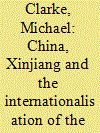

|
|
|
|
|
| Publication |
2010.
|
| Summary/Abstract |
This paper argues that Beiijing's handling of the Xinjiang and Uyghur issues at the domestic, regional and international levels is characterised by a number of contradictions. Domestically, the July 2009 unrest suggests that China's longstanding approach to Xinjiang is at risk of failure due to the contradictions inherent in the logic that underpins Beijing's strategy. Regionally, Beijing faces a contradiction between its growing influence on the governments of Central Asia and the ambivalent attitude of Central Asian publics towards China. Internationally, the major implication of the July unrest has been to signal the internationalisation of the Uyghur issue whereby it has become a significant irritant in Beijing's relations with a number of major Western states, including the USA and Australia. It has been Beijing's own approach to Xinjiang domestically and its handling of the Uyghur issue in its diplomacy that has contributed to the internationalisation of the issue.
|
|
|
|
|
|
|
|
|
|
|
|
|
|
|
|
| 2 |
ID:
096685
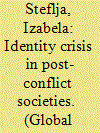

|
|
|
|
|
| Publication |
2010.
|
| Summary/Abstract |
Being attentive to initial reconstruction of identities in post-conflict environments is critical because robust group images are absent and there remains time and space for shifts in policy. Applying theories of social psychology, overlooked in literature on ethnic violence, peace-building, and reconciliation, this article examines characteristics and consequences of the emerging socio-psychological trend of 'defensive nationalism' in post-conflict Serb narratives. The article argues that the proceedings of the International Criminal Tribunal for the Former Yugoslavia (ICTY) have contributed to an identity crisis among the Serbs, and identifies the issues of 'individual versus collective' guilt and 'legal versus political' trials as major factors. The destabilization of the Serb self-image on the global scene has instigated new, and furthered old, forms of defensiveness, leading to the dismissal of the tribunal's proceedings in favor of contradictory and conspiracy accounts. The point of conducting fair and effective prosecutions is undermined if reconciliation opportunities are simultaneously diminished.
|
|
|
|
|
|
|
|
|
|
|
|
|
|
|
|
| 3 |
ID:
096683
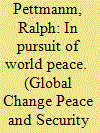

|
|
|
|
|
| Publication |
2010.
|
| Summary/Abstract |
In the modernist context that frames contemporary world affairs, questions about the pursuit of world peace are typically answered in terms that prioritize the use of reason as an end in itself. Modernist rationalism is not the only way in which questions about the pursuit of peace can be asked and answered, however. There are sacralist alternatives to it and there are cosmopious alternatives to both modernism and sacralism. Cosmopiety is the heart of every global religion. Since in this article the sacral focus is placed upon Islam, it is therefore placed upon the Sufi teachings that articulate Islamic mysticism. To show what such teachings entail, those of Bawa Muhaiyadden, a Sufi saint and sage, are briefly outlined.
|
|
|
|
|
|
|
|
|
|
|
|
|
|
|
|
| 4 |
ID:
096682
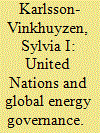

|
|
|
|
|
| Publication |
2010.
|
| Summary/Abstract |
The link between energy, economic development and national security has often made governments reluctant to address energy in global governance. In the United Nations (UN) system and beyond, the result has been almost a normative and institutional vacuum on energy. In the last decade some efforts have been made to fill this vacuum within the UN but they have faced considerable resistance, and instead initiatives have multiplied outside it. This article outlines the dynamics of the low profile of the energy issue on the agenda of the UN since the organisation's birth, analyses in more detail the efforts to strengthen this agenda in the 2000s, and also why they failed. Finally, it discusses possible future options for the UN and the international community at large to address this urgent issue, situates this discussion in the rationalist and constructivist theories of effective and legitimate global governance and outlines further research avenues.
|
|
|
|
|
|
|
|
|
|
|
|
|
|
|
|
| 5 |
ID:
096681
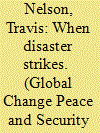

|
|
|
|
|
| Publication |
2010.
|
| Summary/Abstract |
This article asks under what circumstances natural disaster can lead to interstate conflict initiation. Through an analysis of all major earthquakes, floods, storms, and tsunamis between 1950 and 2006, I find that serious disaster increases the general likelihood of conflict initiation, and I reach two key conclusions about the specific causal mechanisms driving post-disaster conflict. First, I show that there is not a single instance of a rival or opponent state taking the opportunity to initiate military conflict in the aftermath of serious disaster. This finding supports the developing literature on 'disaster diplomacy'. Second, there are, however, cases in which states with a recent history of significant civil disruption initiate such conflicts themselves. In these situations, disaster can contribute to the conflict environment and can make conflict initiation significantly more likely. I find that, counter-intuitively, it is the very states most vulnerable and most weakened by disaster that are likely to initiate conflict in a post-disaster environment.
|
|
|
|
|
|
|
|
|
|
|
|
|
|
|
|
|
|
|
|
|